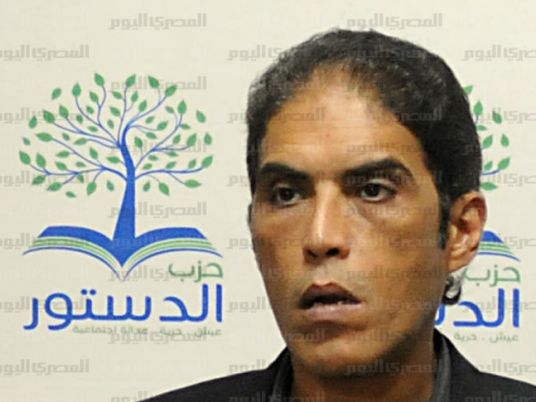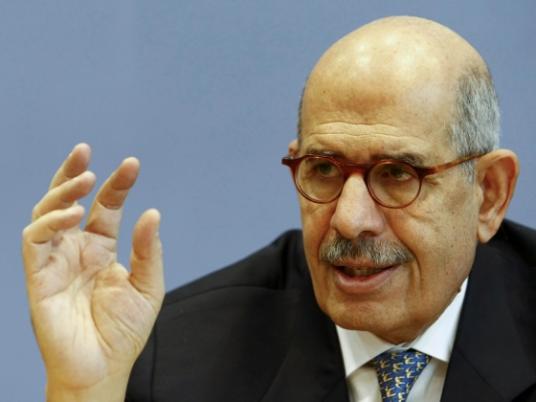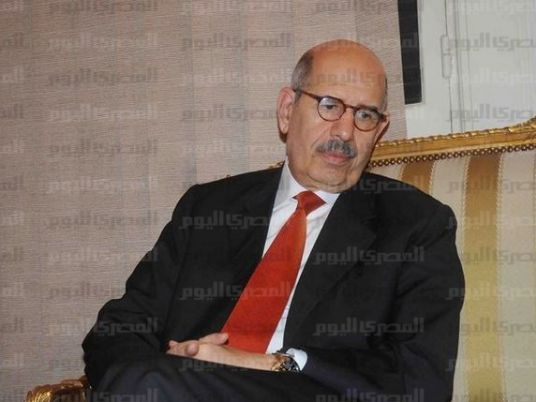Washington DC–Today at 6 PM EST, a group of independent Egyptian academics will meet with Mohamed ElBaradei at Harvard University’s Kennedy School in Boston.
A few days ago, a group of independent Boston-based Egyptian academics sent a Facebook invitation to Egyptian faculty and graduate students living in the United States to meet with ElBaradei in a small gathering. Egyptian expats then flew and drove for hundreds of miles across North America for the meeting. Part of his trip to the United States of America, ElBaradei dedicated a special meeting with Egyptian faculty and graduate students in America to discuss his latest campaign for change.
In recent months, ElBaradei has been the symbol around which Egyptian expats in America have gathered. The way to go about supporting ElBaradei, however, has exposed a division in the approach of independent individuals, specifically university professors and graduate students in the community, and the Coalition for Egyptian Organizations in North America and its prominent members, such as Professor Saad el-Din Ibrahim. It is necessary, however, to glimpse at the politics of Egyptian activism in America in light of the latest enthusiasm for Egypt’s prospects of change.
Zeinab Abul Magd, an Egyptian professor at Oberlin College, is flying from Ohio for the meeting. She narrated her involvement with ElBaradei’s supporters as follows: “Once I heard the debates on ElBaradei’s possible running for presidency and later the establishment of the Egyptian Association for Change, I supported him. Even if he is not my perfect candidate and I probably would not have voted for him in normal conditions, we have to rally around him as a symbol of change.”
Mohamed Saeed, a graduate student at Georgetown University is driving from DC for the meeting. “ElBaradei is a phenomenon that cannot be ignored and we have to engage with him, ” Saeed stated. “We are not talking about a presidential race at this point, but we need to see how we can link ElBaradei as a symbol for change to the five-year old continuous struggle in Egypt manifested in the daily strikes that are taking place,” he said.
Most Egyptian expats going to the meeting are enthusiastic about ElBaradei’s campaign, while their political stances and approach towards political activism varies. Professor Adel Iskander of Georgetown University relays the political dynamics of the Egyptian diaspora: “Because there are many different political currents among the Egyptian diaspora in America, they might not share similar visions, but ElBaradei is bringing them together.”
Iskander insisted that he was going to the meeting as an independent however: “I’m very careful not to have any political organization speak on my behalf,” he said. Academics’ insistence on their independence speaks to their reluctance to be affiliated with Egyptian advocacy organizations in America.
A year-and-a-half ago, a coalition of the various politically active organizations of Egyptian expats calling for reform at home was formed under the umbrella of the Coalition of Egyptian Organizations in North America. When the news of ElBaradei’s participation in Egyptian politics surfaced, the Coalition supported the goals of his Egyptian Association for Change. It called for a number of meeting to find ways of supporting ElBaradei.
On 3 April, a roundtable of Egyptians from the Coalition and others including students, professors, NGO workers, diverse professionals, and physicians tagged their mission to ElBaradei’s movement, calling themselves the Egyptian Association for Change-USA. They drafted a petition demonstrating their support for the Association for Change’s demands for “a constitutional change that guarantees social justice, allows independent candidates to run for presidency, and puts an end to the state of emergency.” The goals of these demands, says the petition, is “the organization of free, fair and clean Egyptian elections.”
Those signing up to the petition demanded their constitutional right to vote in the upcoming elections using their Egyptian IDs and passports at their embassy in DC or consulates across American. And to put their words into action, the Egyptian Association for Change-USA, under the leadership of the Coalition of Egyptian Organizations in North America plans to stage a demonstration on May Day in front of the Egyptian embassy, demanding the right of Egyptians to vote from abroad in the upcoming elections.
Professor Saad el-Din Ibrahim is a member of the Coalition of Egyptian Organizations in North America. He joined the 3 April meeting via Skype, announcing his intention to donate US$5000 to the Association for Change-USA. “I am the president of two organizations, Ibn Khaldoun in America, and Voices for a Democratic Egypt, which are now part of the Coalition of Egyptian Organizations in North America,” said Ibrahim. “We, as a Coalition, agree with ElBaradei’s call for reform and add our demands by calling for the constitutional right of Egyptians abroad to vote in Egyptian elections. We also protest the latest deportation of ElBaradei supporters in Kuwait,” he added.
Independent academics, however, have shied away from being affiliated with the Coalition. “I felt very uncomfortable with Ibrahim’s involvement,” Abul Magd said. “I know others who refused to go to this 3 April meeting because they did not want to be affiliated with Saad el-Din Ibrahim and others with a similar vision,” she added, saying that her uneasiness with figures such as Ibrahim stems from a rejection of their lobbying for the American administration to push for democratization in Egypt. “Any help from the administration in Washington DC only serves American hegemony and this is what I reject; this also is the reason for my uneasiness with Ibrahim’s soliciting of American support,” Abul Magd said.
Such a fear of American intervention in Egyptian affairs and the stigma associated with being an “American ally” is one reason Egyptian expats like Abul Magd shy away from the prominent Egyptian organizations in America. “Ibrahim has a long political history in Egypt,” explained Iskander, “and because of his persecution at the hands of the Egyptian government, he had to adopt a specific political position vis-a vis the regime.” But, according to Iskander, “the new generation of Egyptians in America want to carve their own path, independent of other figures’ history and political careers. We want to support ElBaradei away from a monopoly of those who speak on the diaspora’s behalf.”
“Change has to emanate from Egypt and people’s struggle there, not from America or any external intervention,” Saeed explained.
It is however unclear at this point how far the politics of Egyptian activism in America is a concern for ElBaradei himself and his campaign. What we know is that ElBaradei chose to meet personally with a small independent group of around 70 Egyptians, mostly professors and graduate students at Harvard Kennedy School. He also chose to meet with a forum of Egyptian-Americans, Rabitat el-Masriyin el-Amrikiyin, which is also independent from the Coalition of Egyptian Organizations in North America.
The Coalition sought to organize a separate meeting with ElBaradei, but was not successful. Professor Saad el-Din Ibrahim will not meet ElBaradei in Harvard, but he told Al-Masry Al-Youm that he will joining ElBaradei on CNN this Wednesday for a televised dialogue hosted by Christian Amanpoure. “It will be Amanpoure’s last show ever with CNN, and she requested that I join her in this show. It will be a three-way dialogue between ElBaradei, Ahmed Ezz and myself on the question of change in Egypt,” Ibrahim explained.
Egyptians in America, regardless of their affiliations and political stance, still intend to support the May Day demonstration in front of their embassy, demanding their constitutional right to vote in the upcoming Egyptian elections. “The demonstration is important regardless of who is involved. It is a common cause that all Egyptian expats need to rally for,” said Abul Magd.
Iskander, like Abul Magd, will support the demonstration: “Yes, I am willing to participate in the demonstration, but I still have to register my concern that some voices might be over-shadowed by others.” He also cautioned that “it is healthiest for Egyptians in America to act as individuals, not part of an institution.”
Also in support of the May Day demonstration, Saeed noted that “there are 6-7 million Egyptians living abroad, and it is their constitutional right to participate in Egypt’s elections. They can be influential in stirring the path of change.”



